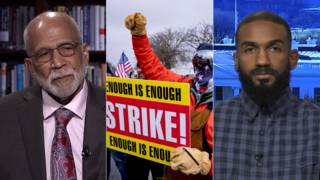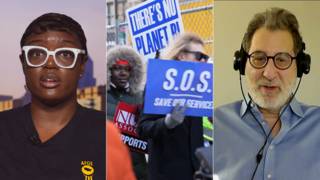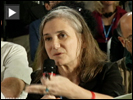
Related
Longtime environmental writer and activist and 350.org founder Bill McKibben has won the 2010 Puffin/Nation Prize for Creative Citizenship. Speaking outside the U.N. Climate Change Conference in Cancún, McKibben says, “In certain ways, [a U.S. walkout] would be the best thing that could happen. For 15 years … the U.S. comes and says, weaken the agreement so we can get Congress to go along. Then Congress doesn’t agree anyway. It’s wrecked the whole process, time after time after time, and now the U.S. is doing it again.” [includes rush transcript]
Transcript
AMY GOODMAN: We’re broadcasting from Cancún, Mexico. For more on the issue of the WikiLeaks cables and the international climate change talks, I spoke with the longtime environmental writer and activist Bill McKibben here in Cancún. He’s the founder of 350.org and the winner of the 2010 Puffin/Nation Prize for Creative Citizenship. He received the prize last night in New York along with Planned Parenthood president Cecile Richards.
Well, here in Cancún on Saturday night, just before he flew to New York, I asked Bill McKibben about his reaction to the diplomatic cables released by WikiLeaks showing how the U.S. manipulated last year’s climate talks in [Copenhagen].
BILL McKIBBEN: Some of the new data coming out today makes it clear that everyone’s suspicion that the U.S. was both bullying and buying countries into endorsing their do-little position on climate were even sort of worse than we had realized. You know, the sums that people were tossing around and the demands that they were making of small nations, in particular, to endorse their stand were pretty — were pretty gross, not because it comes as any great surprise that we toss our power around — that’s what we do — but because on this issue, above all else, you know, in the end, making some political agreement enforcing our particular set of interests is such a bad idea, because it’s physics and chemistry that are actually driving the tune. And we can, you know, win every fight because we’re powerful and wealthy and whatever, and we’re still going to lose the war just as badly as everybody else. So, I think it kind of undermines the bankruptcy of a lot of this COP process and the fact that we’re going to need, in civil society, to build a movement big enough to really exert some power. I don’t know whether we can do that. We haven’t done it yet. The oil industry and their friends in the U.S. government are, you know, winning most of the battles. But we’re going to keep trying. And this gives us kind of new impetus to do it.
AMY GOODMAN: And the reports that Bolivia, Venezuela, Ecuador and other countries, the ALBA countries, are threatening to pull out of these talks if countries do not commit again to Kyoto, to mandatory caps on emissions?
BILL McKIBBEN: Well, I mean, here’s one way to look at — sort of look at it the opposite way. The first people who threatened to kind of walk away from the talks were the Americans last week. “Unless everybody else signs up for targets, we’re going to walk out.” OK? In certain ways, that would be the best thing that could happen. This is what for 15 years now the dynamic of these talks has been. The U.S. comes and says, “Weaken the agreement, so we can get Congress to go along and do something about it.” Everybody weakens the agreement, first in Kyoto and then in Copenhagen. And then Congress doesn’t agree anyway. You know, you sort of — they sort of — it’s like a flirtation that never goes anywhere. And it’s wrecked the whole process, time after time after time.
And now the U.S. is doing it again. This time they’re saying, “You don’t get any climate aid, unless we weaken the agreement and do what we want,” and, you know, so on and so forth. Well, look, I’d say, if you’re really counting, if you’re a poor nation counting on some climate aid from the U.S., man, ask for a receipt, because I’m not convinced the new Senate and House is going to come across with anything anyway. Four U.S. senators on Thursday said — sent a letter to Secretary of State Clinton, saying, “Don’t give them any money at all for anything. This global warming is a hoax, and we don’t want American money wasted on those nasty poor countries,” you know? America has poisoned this process time and time again, and we really need to start standing up to that.
AMY GOODMAN: The fact that the House is saying the Republicans, when they take over the leadership, will get rid of the global warming — the Climate Change Commission?
BILL McKIBBEN: It’s as if they’re saying — I mean, literally as if they’re saying, “We’re going to stick our fingers in our ears, and the problem will go away. We’ll never have another hearing on it, so therefore it won’t be happening.” I’m afraid that’s about as unlikely a proposition — I mean, more power to them if you could make global warming disappear by simply not talking about it. It would be a hell of a good strategy. But my guess is that physics and chemistry will be remarkably unimpressed by this position, you know? I mean, Congress — the sort of delusions of grandeur within the Beltway are enormous. They think because they can change the tax code, they can change the laws of nature. But that’s not possible.
AMY GOODMAN: Congratulations on receiving the Puffin Award and on your 50th birthday, Bill.
BILL McKIBBEN: Well, it’s a — this award from the Nation Institute and the Puffin Foundation is very nice, and I think it’s a real tribute to the people all over the world who, in the last couple of years, out of pretty much nowhere, have rallied around this sort wonky scientific data point, 350 parts per million, and shown that we’re at least going to give these guys a fight. I don’t know if we’re going to win. The oil industry and the coal industry are awfully strong. But we’re going to give them a fight. And we’ll see.
AMY GOODMAN: And when you say 350 parts per million, explain.
BILL McKIBBEN: Three-fifty is the most important number in the world. Three years ago, our best scientists at NASA said any amount of carbon in the atmosphere greater than 350 parts per million is not compatible with the planet on which civilization developed or to which life on earth is adapted. OK? The trouble is, because we’ve burned so much coal and gas and oil already, the atmosphere here in Cancún and every place else in the world is 390 parts per million CO2. That’s why the Arctic is melting. It’s why Russia is on fire. It’s why Pakistan is drowning. It’s why we’ve got to work way faster than we thought we did even a few years ago. And so, at 350.org, we’ve rallied people. You know, we held, this fall, this global work party with 7,400 events in 188 countries, what CNN called the most widespread day of political action in the planet’s history. And we’re beginning to build this movement. It’s not anywhere near big enough yet. I don’t know if it’ll get there. But we’re trying as hard as we can.
AMY GOODMAN: And Cancún? You’re already talking about Johannesburg, South Africa, next year.
BILL McKIBBEN: Yes.
AMY GOODMAN: But Cancún isn’t done.
BILL McKIBBEN: Cancún, I mean, it’s like watching — I mean, this process, this U.N. process, has been going on forever, and it’s getting nowhere, and it’s not going to get anywhere substantive, until we have some power from the outside to push it.
AMY GOODMAN: I saw some young people with T-shirts that said, “You have been negotiating all my life.”
BILL McKIBBEN: It’s a — somebody, some friend of mine, said, who I saw the other day drawing on the street, who I hadn’t seen since the last one of these, said, “It’s just like a family reunion aboard the Titanic, you know?” And that’s sort of what it feels like. We can’t keep doing this. Until we can build some power outside of these arenas to actually push these guys, you know, this is — in the end, it’s not about how well people are communicating or how great the policy papers are. It’s on who has the power. And at the moment, that power rests in the hands of the fossil fuel industry and their allies in governments around the world. And until we build some independent outside movement power to push back, then we’re never going to get — we’re going to get scraps from the table, at the very best.
AMY GOODMAN: Do you see the fossil fuel industry here in Cancún?
BILL McKIBBEN: You see their fingerprints on every single thing that happens. When, you know, Saudi Arabia stands up to say something, when the U.S. stands up to say something, it’s on limitations — you know, they’re limitations imposed by the fossil fuel industry. That’s who’s speaking. That’s where the power lies.
AMY GOODMAN: Bill McKibben, winner of the 2010 Puffin Prize. He was speaking to us in Cancún. He’s founder of 350.org.












Media Options